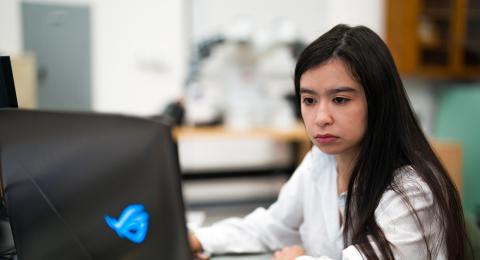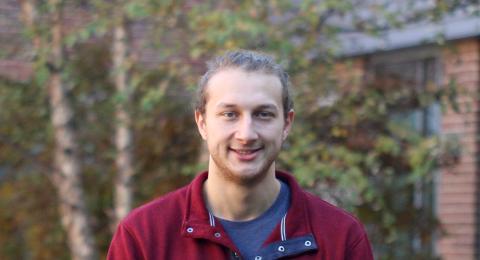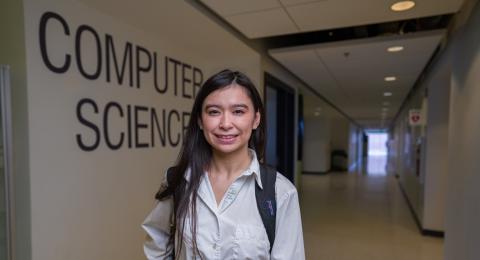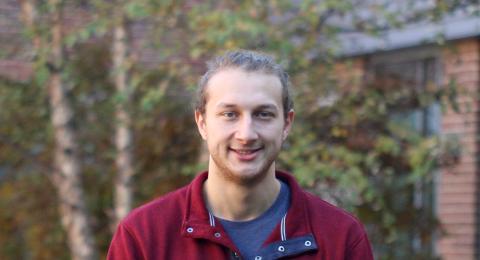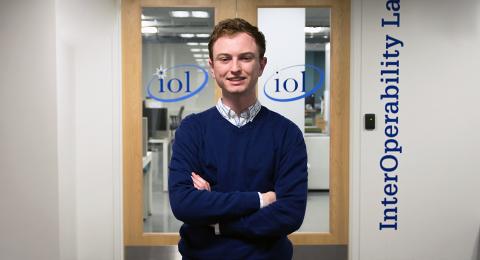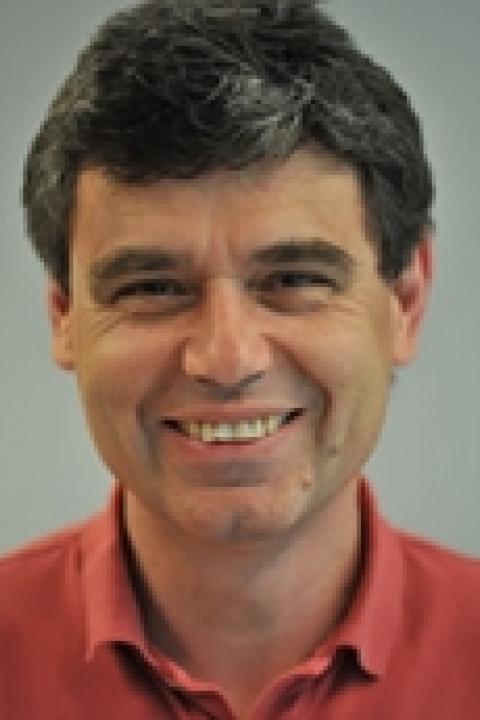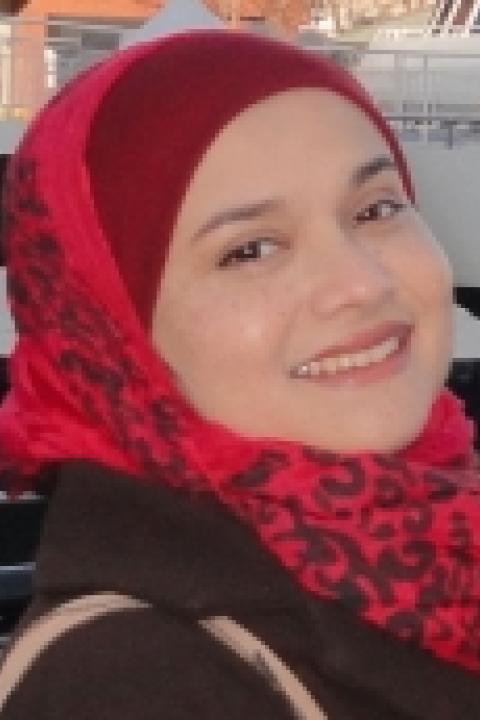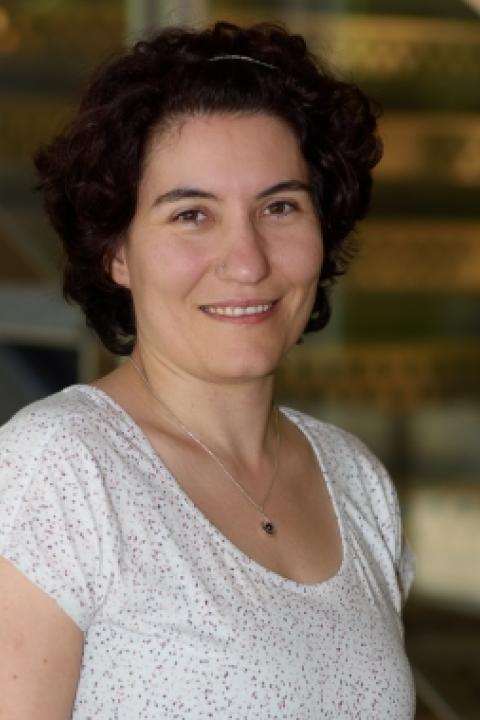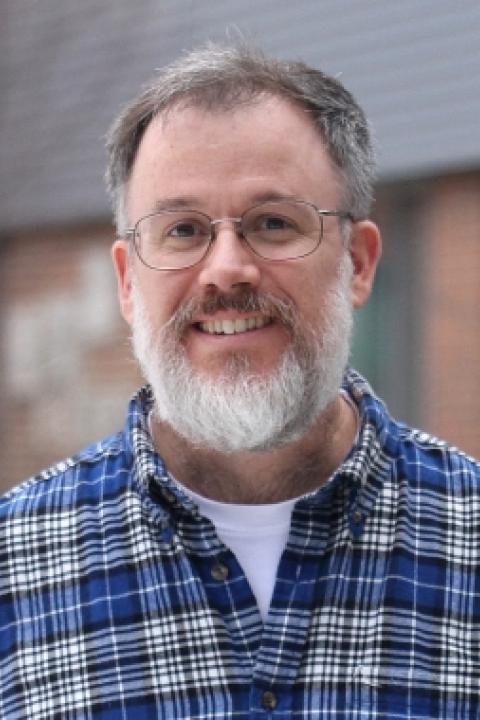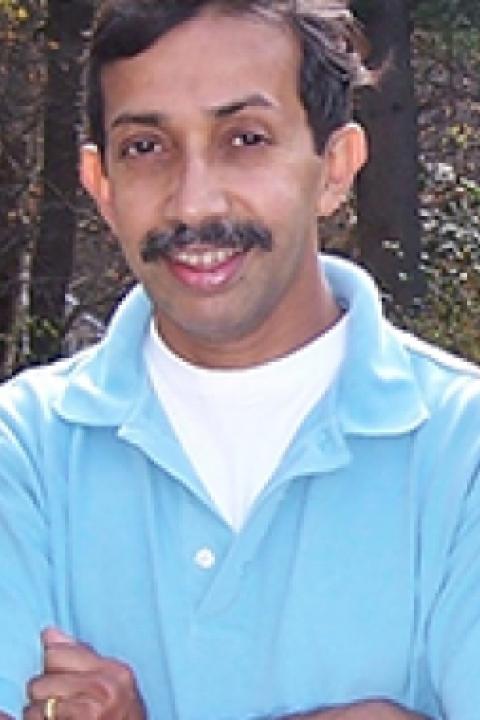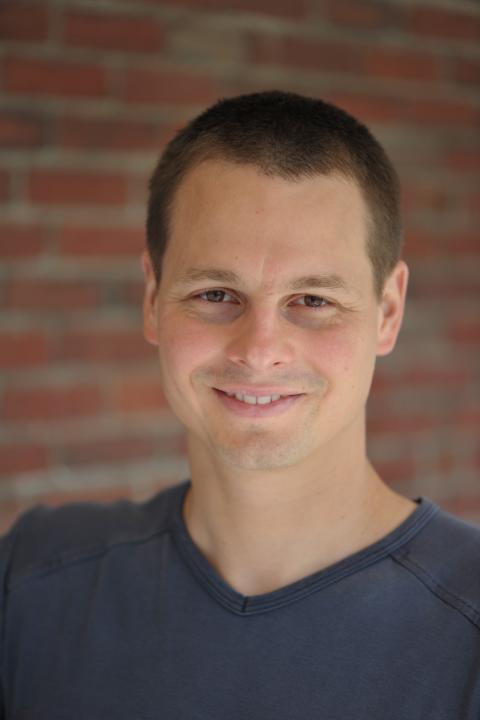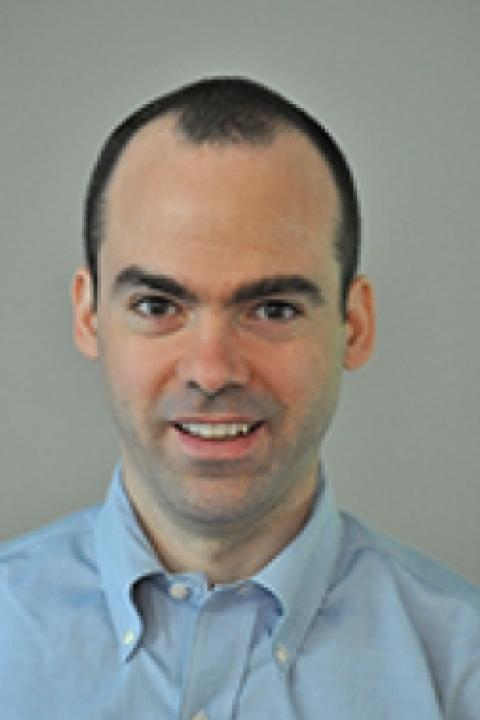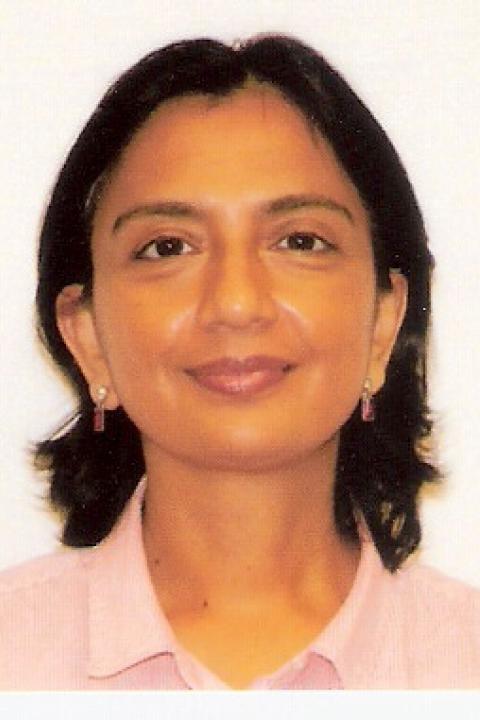What is a Bachelor of Science in computer science?
This program is tailored to students who want to focus on problem solving, with an emphasis on the design of computer-efficient solutions. The curriculum is rooted in fundamentals; students gain the skills and knowledge necessary to enter this ever-changing field with confidence. With a solid foundation in science and mathematics, students also develop strong problem-solving skills and abstract thinking, and many work in laboratories to get hands-on experience building software systems. Graduates of this program pursue advanced degrees or join the professional world in a wide range of positions.
Why study computer science at UNH?
You’ll have access to the UNH InterOperability Lab, where you’ll work alongside top tech companies to test their equipment before it hits the marketplace. All computer science students are encouraged to conduct research through capstone projects and independent studies. Many of UNH’s student organizations are a natural fit for computer science majors, such as the Cyber Security Club, the Linux Club, and Wildcat Women in Computer Science. Plus, the Programming Assistance Center offers walk-in support and tutoring.
Potential Careers
- Computer programmer
- Computer systems analyst
- Database developer
- Mobile application developer
- Network systems administrator
- Software engineer
- Web developer
Curriculum & Requirements
Computer science focuses on problem solving with a particular emphasis on the design of computer-efficient solutions. Within a few years of obtaining a bachelor's degree alumni will have:
- Engaged in successful careers in diverse areas of software development and will be pursuing advanced education in computer science or related fields;
- Applied the full range of core computer science concepts and techniques to fill software development needs of an organization;
- Adapted to changing directions of computing technology and used state-of-the-art techniques to confront new problems effectively;
- Navigated the complex interconnections between software and the goals and constraints of the organization served;
- Participated responsibly in the pervasive and changing role of computing technology in global society as both software engineers and citizens;
- Operated collaboratively in a team environment and assumed leadership roles.
The B.S. in computer science program is accredited by the Computing Accreditation Commission of ABET.
Sample Degree Plan
This sample degree plan serves as a general guide; students collaborate with their academic advisor to develop a personalized degree plan to meet their academic goals and program requirements.
| First Year | ||
|---|---|---|
| Fall | Credits | |
| CS 400 | Introduction to Computing | 2 |
| CS 415 | Introduction to Computer Science I | 4 |
| IT 403 | Introduction to Internet Technologies | 4 |
| MATH 425 | Calculus I | 4 |
| Discovery I | 4 | |
| Credits | 18 | |
| Spring | ||
| CS 416 | Introduction to Computer Science II | 4 |
| CS 420 | Foundations of Programming for Digital Systems | 4 |
| MATH 426 | Calculus II | 4 |
| ENGL 401 | First-Year Writing | 4 |
| Credits | 16 | |
| Second Year | ||
| Fall | ||
| CS 515 | Data Structures and Introduction to Algorithms | 4 |
| CS 518 or CS 527 | Introduction to Software Engineering or Fundamentals of Cybersecurity | 4 |
| MATH 531 or MATH 539 or MATH 644 | Mathematical Proof or Introduction to Statistical Analysis or Statistics for Engineers and Scientists | 4 |
| CS 501 | Professional Ethics and Communication in Technology-related Fields (or Discovery II) | 4 |
| Credits | 16 | |
| Spring | ||
| CS 520 | Computer Organization and System-Level Programming | 4 |
| MATH 539 or MATH 644 or MATH 531 | Introduction to Statistical Analysis or Statistics for Engineers and Scientists or Mathematical Proof | 4 |
| CS 527 or CS 518 | Fundamentals of Cybersecurity or Introduction to Software Engineering | 4 |
| Discovery II (or CS 501) | 4 | |
| Credits | 16 | |
| Third Year | ||
| Fall | ||
| CS 619 | Introduction to Object-Oriented Design and Development | 4 |
| CS 620 | Operating System Fundamentals (or Professional Elective) | 4 |
| CS 659 | Introduction to the Theory of Computation | 4 |
| Discovery III | 4 | |
| Credits | 16 | |
| Spring | ||
| CS 758 or CS 761 | Algorithms or Programming Language Concepts and Features | 4 |
| CS 700-level Elective I | 4 | |
| Professional Elective (or CS 620) | 4 | |
| Discovery IV | 4 | |
| Credits | 16 | |
| Fourth Year | ||
| Fall | ||
| CS 791 | Senior Project I | 2 |
| CS 761 or CS 758 | Programming Language Concepts and Features or Algorithms | 4 |
| CS 700-level Implementation Elective (or 700-Level Elective II) | 4 | |
| Discovery V | 4 | |
| Discovery VI | 4 | |
| Credits | 18 | |
| Spring | ||
| CS 792 | Senior Project II | 2 |
| CS 700-level Elective II (or Implementation Elective) | 4 | |
| CS 700-level Elective III | 4 | |
| Discovery VII | 4 | |
| Credits | 14 | |
| Total Credits | 130 | |
Discovery (7): Historical Perspectives, Humanities, Fine and Performing Arts, Social Science, World Cultures, Physical Science Discovery Lab, Biological Science Discovery Lab with ONE mandatory course with Writing Intensive (WI) attribute
Degree Requirements
All Major, Option and Elective Requirements as indicated.
*Major GPA requirements as indicated.
Major Requirements
Computer science majors must maintain an overall grade-point average of 2.0 or better in all required computer science, mathematics, and computer engineering courses in order to graduate. If at the end of any semester, including the first, a student's cumulative grade-point average in these courses falls below 2.0, the student may not be allowed to continue as a CS major.
The following courses or their equivalents must be passed with a grade of C- or better in order to meet the CS major requirements: CS 415, CS 416, CS 420, CS 515, CS 520, and IT 403.
Students are expected to demonstrate consistent progress towards the satisfaction of the core degree requirements and are allowed two repeats of the aforementioned courses before being dismissed from the program. This can be a single course repeated twice or two courses repeated once. Students may petition for reinstatement one-year after program dismissal.
If a student wishing to transfer into the computer science major has any coursework that is applicable to the major, the grades in those courses must satisfy the minimum grade requirements for the B.S. degree in computer science. The student must have an overall grade-point average of 2.0 or better in all courses taken at the university.
Computer science majors must complete the following coursework in computer science, mathematics, computer engineering, and science. (all courses are 4 credits unless indicated otherwise):
| Code | Title | Credits |
|---|---|---|
| Computer Science Courses | ||
| CS 400 | Introduction to Computing | 2 |
| CS 415 | Introduction to Computer Science I | 4 |
| or CS 410C | Introduction to Scientific Programming/C | |
| or CS 410P | Introduction to Scientific Programming/Python | |
| CS 416 | Introduction to Computer Science II | 4 |
| CS 420 | Foundations of Programming for Digital Systems | 4 |
| IT 403 | Introduction to Internet Technologies | 4 |
| CS 501 | Professional Ethics and Communication in Technology-related Fields | 4 |
| CS 515 | Data Structures and Introduction to Algorithms | 4 |
| CS 518 | Introduction to Software Engineering | 4 |
| CS 520 | Computer Organization and System-Level Programming | 4 |
| CS 527 | Fundamentals of Cybersecurity | 4 |
| CS 619 | Introduction to Object-Oriented Design and Development | 4 |
| CS 620 | Operating System Fundamentals | 4 |
| CS 659 | Introduction to the Theory of Computation | 4 |
| CS 758 | Algorithms | 4 |
| CS 761 | Programming Language Concepts and Features | 4 |
| CS 791 & CS 792 | Senior Project I and Senior Project II | 4 |
| or CS 799 | Thesis | |
| Computer Science Electives: | ||
| Select one course from the following implementation electives: | 4 | |
CS 712 | Compiler Design | |
CS 720 | Systems Programming | |
CS 730 | Introduction to Artificial Intelligence | |
CS 735 | Introduction to Parallel and Distributed Programming | |
CS 752 | Foundations of Neural Networks | |
CS 753 | Information Retrieval and Generation Systems | |
CS 770 | Computer Graphics | |
CS 781 | Data Science for Knowledge Graphs and Text | |
| Select three additional CS courses numbered 690-799 | 12 | |
| Professional Electives 1 | ||
| Select one course from the following: | 3-4 | |
CS 700-level course | ||
IT 502 | Intermediate Web Design | |
IT 604 | Server-side Web Development | |
IT 605 | Full-Stack Web Development | |
IT 612 | Scripting Languages | |
IT 630 | Data Science and Big Data Analytics | |
IT 666 | Cybersecurity Practices | |
IT 705 | Project Management for Information Technology | |
MATH 525 | Linearity I | |
MATH 526 | Linearity II | |
MATH 527 | Differential Equations with Linear Algebra | |
MATH 528 | Multidimensional Calculus | |
MATH 545 | Introduction to Linear Algebra | |
MATH 645 | Linear Algebra for Applications | |
MATH 647 | Complex Analysis for Applications | |
MATH 736 | Advanced Statistical Modeling | |
MATH 737 | Statistical Methods for Quality Improvement and Design | |
MATH 739 | Applied Regression Analysis | |
MATH 740 | Design of Experiments I | |
MATH 741 | Survival Analysis | |
MATH 743 | Time Series Analysis | |
MATH 745 | Foundations of Applied Mathematics I | |
MATH 747 | Introduction to Nonlinear Dynamics and Chaos | |
MATH 753 | Introduction to Numerical Methods I | |
MATH 755 | Probability with Applications | |
MATH 756 | Principles of Statistical Inference | |
MATH 760 | Geometry | |
MATH 761 | Abstract Algebra | |
MATH 767 | One-Dimensional Real Analysis | |
MATH 783 | Set Theory | |
MATH 784 | Topology | |
MATH 788 | Complex Analysis | |
ECE 562 | Computer Organization | |
ECE 649 | Embedded Microcomputer Based Design | |
ECE 700-level course | ||
GEN 604 | Principles of Genetics | |
GEN 711 | Genomics and Bioinformatics | |
| Mathematics Courses | ||
| MATH 425 | Calculus I | 4 |
| MATH 426 | Calculus II | 4 |
| MATH 531 | Mathematical Proof | 4 |
| MATH 539 | Introduction to Statistical Analysis | 4 |
| or MATH 644 | Statistics for Engineers and Scientists | |
| Science courses 2 | ||
| One Discovery Biological Science (BS) with Discovery Lab | 4 | |
| One Discovery Physical Science (PS) with Discovery Lab | 4 | |
| Other Courses | ||
| Discovery requirements not already covered by required courses 3 | 24 | |
| Total Credits | 129-130 | |
- 1
- Professional electives must either be chosen from the list of approved courses or another non-introductory CEPS course with significant science and/or engineering focus approved on a per-course basis by the undergraduate studies committee.
- 2
Courses must carry the Discovery attributes of Biological Science or Physical Science and include Discovery lab (DLAB).
- 3
One of these courses must be writing intensive.
Program Learning Outcomes
Graduates of the UNH BS CS program will have an ability to:
- Analyze a complex computing problem and to apply principles of computing and other relevant disciplines to identify solutions.
- Design, implement, and evaluate a computing-based solution to meet a given set of computing requirements in the context of the program’s discipline.
- Communicate effectively in a variety of professional contexts.
- Recognize professional responsibilities and make informed judgments in computing practice based on legal and ethical principles.
- Function effectively as a member or leader of a team engaged in activities appropriate to the program’s discipline.
- Apply computer science theory and software development fundamentals to produce computing-based solutions.
- Learn independently about new technologies, and develop the skills needed to understand them.
Explore Program Details
The B.S. in computer science program is accredited by the Computing Accreditation Commission of ABET.
Computing Accreditation Commission of ABET
111 Market Place, suite 1050
Baltimore, MD
21202-4012
Phone: (410) 347-7700
- Course guidelines for students registering as a CS major from fall 2019
- Guidelines for changing to new (AY 2019-2020) catalog requirments
- Course guidelines for students registering as a CS major from fall 2016
- Course guidelines for students who took CS 415 between fall 2014 and spring 2016
Those interested in the Computer Science major may also be interested in the following advanced degrees. Students in the program also have the opportunity to participate in the UNH accelerated master’s program.
